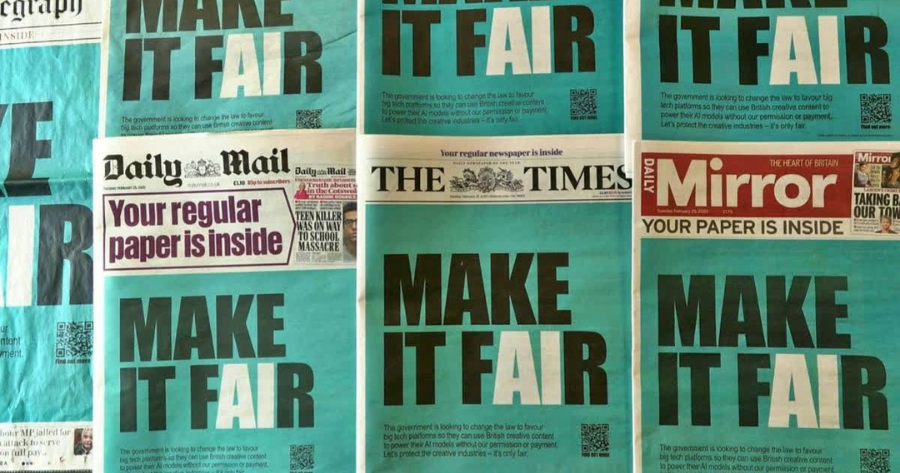The Future of AI Can’t Come at the Cost of Human Creativity
There’s been a lot of noise lately around the UK government’s stance on AI – and I’ve got to be honest, it’s completely understandable why it has raised some serious alarm bells with all of us in the creative industries. Not because we’re against progress or scared of tech (this couldn’t be further from the truth), but because it feels like our rights and the rights of the incredibly talented creators that we get the honour to work with – the very core of what makes creativity valuable – are being treated as collateral damage in the race to lead the AI arms race.

There’s been a lot of noise lately around the UK government’s stance on AI – and I’ve got to be honest, it’s completely understandable why it has raised some serious alarm bells with all of us in the creative industries. Not because we’re against progress or scared of tech (this couldn’t be further from the truth), but because it feels like our rights and the rights of the incredibly talented creators that we get the honour to work with – the very core of what makes creativity valuable – are being treated as collateral damage in the race to lead the AI arms race.
The UK’s Technology Secretary Peter Kyle telling the Financial Times that “critics of the UK’s AI copyright proposal must not ‘resist change’” is a pretty horrifying stance for any government to take. And let’s be real – his caveat about not pitting one industry against another felt more like a hasty backpedal than a genuine reassurance. He knew he’d said the quiet part out loud.
And look, I get it. The potential of AI is enormous. I’ve been in digital rights long enough to know how game-changing technology can be. But what’s happening here isn’t just innovation – it’s extraction.
This Isn’t About Fear – It’s About Fairness
Let’s be clear: no one in music or any other creative field is standing in the way of AI. In fact, many of us are exploring the space and are incredibly inspired by the potential of some of the tools. There’s genuine excitement about what’s possible – from AI-assisted production tools to new ways to interact with fans. But the idea that creative works should be freely scraped, repurposed, and fed into AI models without licensing? That’s not innovation. That’s just skipping the bill. If there is one thing I have learned from my time in the music industry, it’s that when new tech comes knocking, our rights are the first to get hit – and once that door’s open, everything else tends to fall like dominoes.
We’re not asking for AI to stop. We’re asking for the same thing we’ve always asked for: the right to licence our rights. Simple. The music industry has built entire systems around that concept – sync deals, sampling clearance, mechanicals, publishing splits – all to ensure that when art is used, the creator gets paid. Let’s not overcomplicate it – copyright is a property right. If I own something, you can’t just take it. I decide when, where, and how it gets used. Sometimes, the law really is that simple.
So, why should AI get a pass?
The Real Risk Is Cultural, Not Just Economic
When AI is trained on everything from our lyrics to our voices, it’s learning from the very soul of human creativity. And if that’s allowed to happen unchecked, we risk flooding the world with content that looks and sounds like art, but has none of the heart behind it. That’s not just bad for creators – it’s bad for culture.
What’s more worrying is the government framing this as a “pro-innovation” position. But real innovation doesn’t come from hollowing out the creative industries that make the UK such a cultural powerhouse. You don’t build a thriving AI sector by eroding the rights of the people who fuel it.
We Can Build This Future Together – But It Has to Be Built Right
I believe there’s a path forward. A future where AI and creators collaborate, not compete. But to get there, we need strong licensing frameworks. We need transparency. We need respect for the value of original work.
Organisations like GEMA in Germany are already proposing models to licence AI-generated music fairly – it’s not hard. It just requires the will to do it properly.
So no, this conversation isn’t about saying “no” to AI. It’s about saying “yes” to a fair, balanced, and ethical future where creators aren’t cut out of the deal.
This issue goes beyond just music – it’s about protecting the very idea that creativity has value. That ideas matter. That the people behind them should have a say in how they’re used.
So let’s open up this conversation. Whether you’re in music, film, design, or tech – where do you stand? How do we ensure a future where both creators and AI can thrive?
I'd love to know all your thoughts; and let’s make some noise – while we still can.